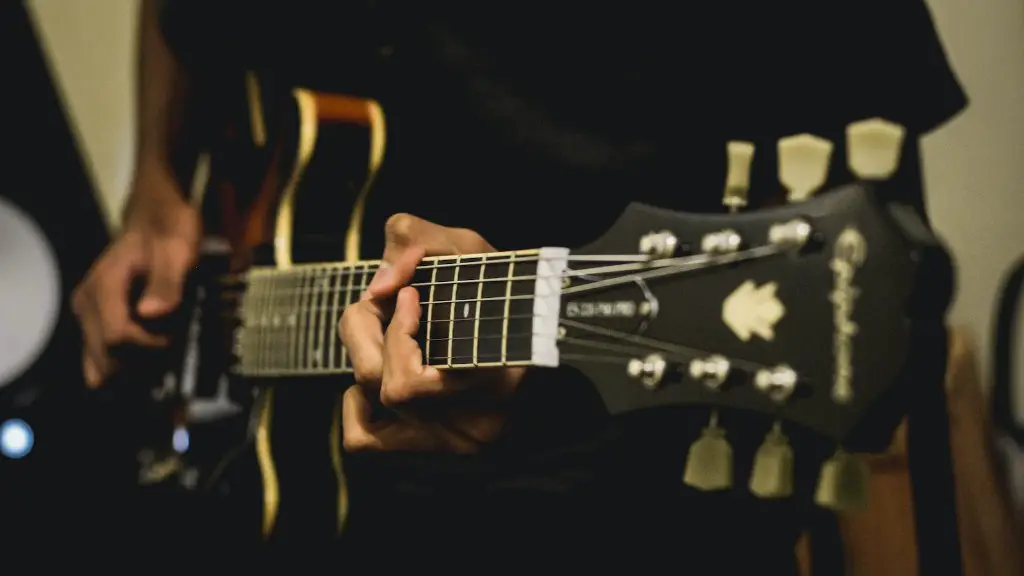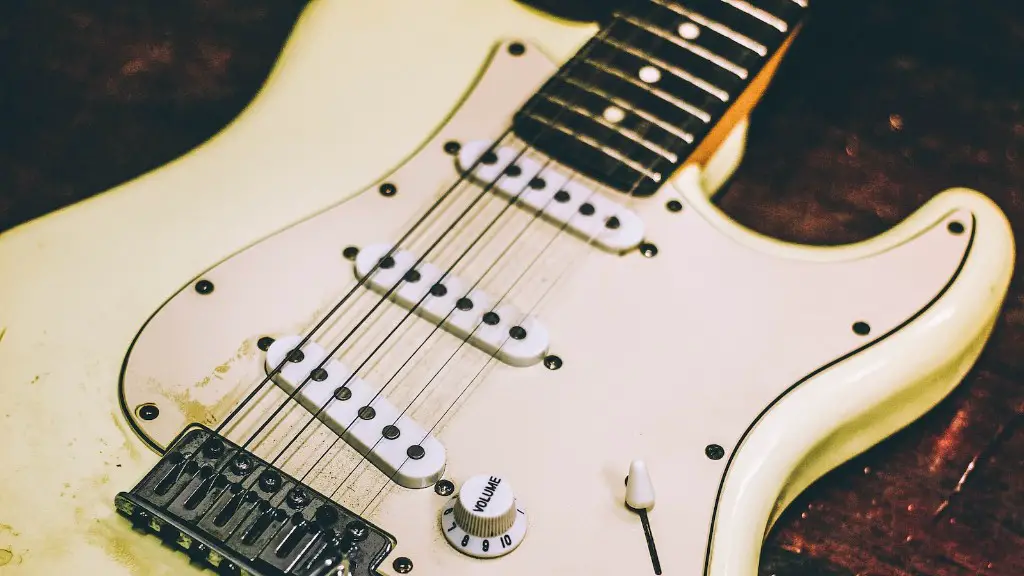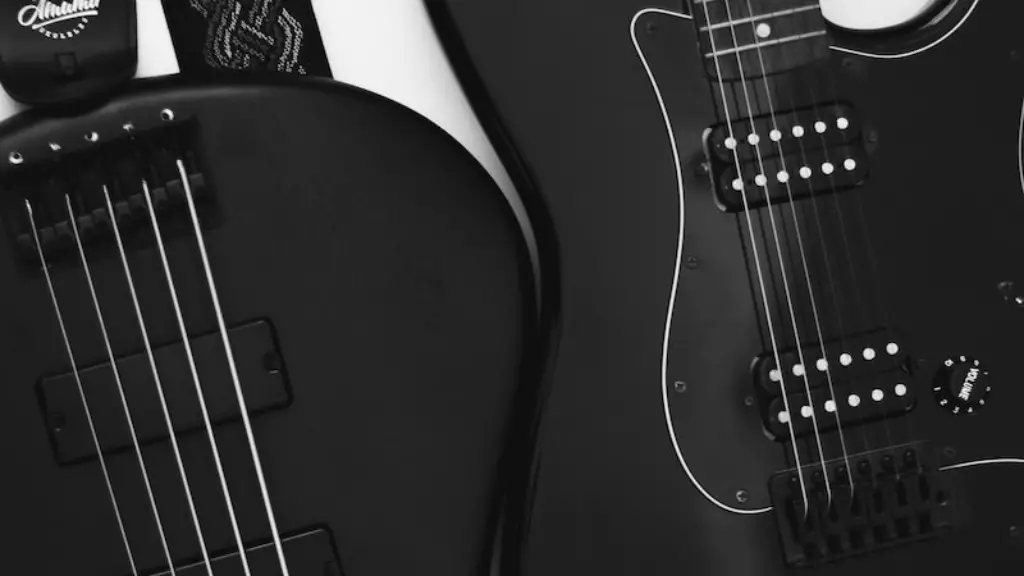The electric guitar is a staple instrument of popular music, and its characteristic sound is instantly recognizable. Electric guitars come in many shapes and sizes, but the most common styles have a solid body with a hollow chamber for the pickups to amplify the sound. Electric guitar tones vary based on the type of guitar and amp being used, as well as the effects that are added.
A clean electric guitar tone has an open quality with plenty of sustain and clarity. Distortion can be added to create a crunchy or heavier sound, while chorus and other effects can be used to create unique textures and colors. The addition of pedals like delays and reverbs can further refine the sound of an electric guitar.
No matter how it’s played, the electric guitar will always remain one of the most iconic instruments in music history. With so many possibilities for creating unique sounds, it’s no wonder why so many musicians continue to explore what this instrument has to offer.
Distorted Electric Guitar Sounds
Electric guitar sounds vary greatly depending on the type of amplifier and effects used. Generally, electric guitars produce a bright, twangy sound with a lot of sustain and distortion. Distortion is a result of overdriving the signal through an amplifier, which causes the sound to become more distorted and saturated. Distortion can be further enhanced by using various effects such as fuzz, distortion and overdrive pedals. This gives a unique tone to the electric guitar that can range from mellow and crunchy to wild and distorted.
Boldly distorted electric guitar sounds are often used in rock and metal music. Heavy distortion can be heard in songs such as “Smells Like Teen Spirit” by Nirvana or “Enter Sandman” by Metallica. Distorted electric guitar sounds often feature heavy palm muting and aggressive picking techniques for a powerful sound. By adjusting the distortion levels, an electric guitar player can create many different tones ranging from gritty blues riffs to screaming metal solos.
Electric Guitar Sounds
Electric guitar sounds are a unique blend of distortion and sustain. The sound of an electric guitar comes from the combination of two distinct elements: the pickups and the amplifier. Pickups capture the sound vibrations of the strings and send them through an amplifier, where they are processed and amplified into a more powerful sound. Electric guitars have a wide range of sounds, from warm, mellow tones to bright and crunchy distortion. Depending on the type of pickups and amp used, electric guitar sounds can be crisp or fuzzy, low or high-pitched.
The most popular electric guitar sounds today are produced by combining different effects pedals with an amplifier to create unique tones. Effects such as reverb, delay, chorus and distortion can be used to create different textures with an electric guitar. Additionally, different techniques such as palm-muting, pick slides and harmonics can be used to create interesting nuances in your sound. With all these options available, it’s easy to create a signature electric guitar sound.
Electric Guitar Effects and Pedals
Electric guitars are known for their unique sound and wide range of tones. Using effects and pedals, guitarists can further customize their sound to create new and interesting sounds. Electric guitar effects such as reverb, delay, distortion, chorus, and wah-wah provide a guitarist with the ability to shape their sound. Pedals also provide an extra layer of control over the guitar’s tone. By combining different effects and pedals together, a guitarist can create unique sounds that can’t be achieved through traditional playing alone.
For example, a guitarist could use a delay pedal to add an echo effect to their playing. This could give the guitar a fuller sound with more depth. Furthermore, a distortion pedal can be used to create a fuzzy or distorted tone that is commonly heard in rock music. Combining different pedals in various combinations allows for even more creative exploration of electric guitar sounds. With the right combination of effects and pedals, electric guitars can produce any type of sound imaginable.
Amplifiers for Electric Guitars
Electric guitars have a unique sound that is best heard through amplifiers. An amplifier boosts the signal created by a guitar’s pickups, allowing the player to control the volume and tone of their instrument. There are a variety of different types of amplifiers available, ranging from small practice amps to powerful rigs used on stage and in the studio. The type of amplifier chosen will depend on the style of music being played and the amount of sound desired.
For those looking for classic rock tones, tube amplifiers are a great choice. These amps feature preamp and power tubes that give your guitar a warm, crunchy sound. For heavier sounds like metal and hard rock, solid state amplifiers provide tight distortion with plenty of headroom. Digital modeling amps can replicate various amp sounds and effects, perfect for players who like to experiment with different styles and sounds. No matter what type of amplifier you choose, you can be sure to rock out with your electric guitar.
Electric Guitar Strings
The electric guitar has a distinct, powerful sound that sets it apart from other stringed instruments. It’s often used in rock, blues, jazz, and other genres of music. Electric guitars produce sound by using an amplifier to drive the strings. The strings vibrate and create sound waves in the air that are heard by the listener.
Electric guitar strings come in different gauges, materials, and tension levels. The gauge of a string refers to its thickness; lighter gauge strings will be easier to press down on the fretboard but will have a weaker sound than heavier gauge strings. Steel strings are the most common type of electric guitar string, but they can also be made of nickel or other materials which can give different sounds.
The tension level of electric guitar strings is also important to consider when choosing the right set for your instrument. Higher tension strings will provide a brighter tone and more sustain while lower tension strings will have a softer tone and less sustain. Experiment with different string combinations to find out what works best for you. With some experimentation you’ll be able to find the electric guitar sound that is perfect for your style and genre of music!
The Role of Pickups in Electric Guitars
Electric guitars use pickups to turn the vibration of the strings into an electrical signal. This allows the guitar to be amplified and manipulated by electronic devices such as amplifiers and effects pedals. The type of pickup used has a huge impact on the overall sound of an electric guitar. Single-coil pickups tend to produce a bright, crisp sound, while humbucking pickups are louder and have a more powerful tone. By combining different pickups in various positions on the guitar, musicians can create a wide range of sounds.
Overall, electric guitars provide a rich and versatile sound that can be adapted for any genre or style of music. From classic rock riffs to heavy metal solos, electric guitars are capable of producing an array of unique tones that make them one of the most popular instruments in modern music. With its wide range of available sounds and tones, electric guitar is truly a versatile instrument that can help bring your musical ideas to life!
Wrap Up
Electric guitar has a wide range of sounds and tones that can be achieved with various combinations of pickups, amp settings, and effects. From the twangy clean sounds of the 1950s to the heavy distortion of 1980s rock, electric guitar is a versatile instrument with an iconic sound. From blues to jazz to metal, different musical genres have their own unique electric guitar sound. To sum it all up, electric guitar is an instrument that can create a range of sounds and tones, depending on how it’s played.




